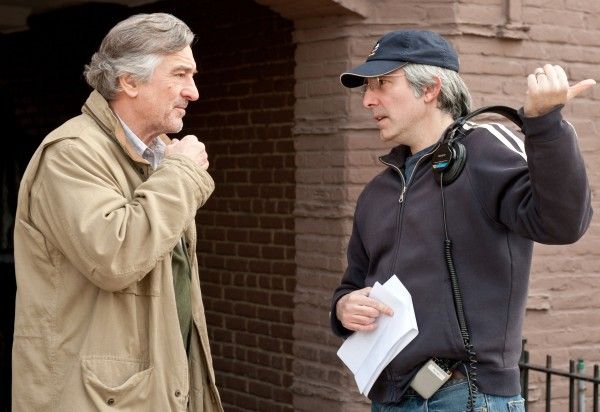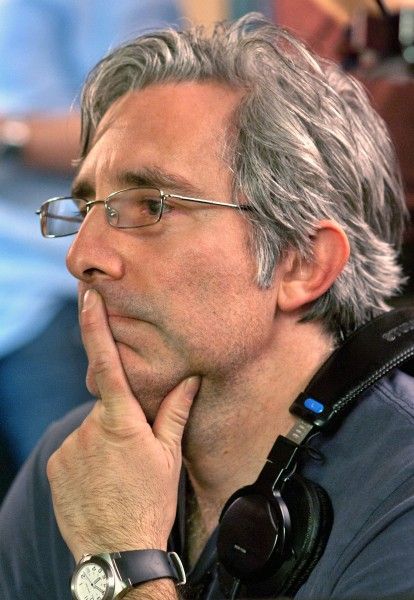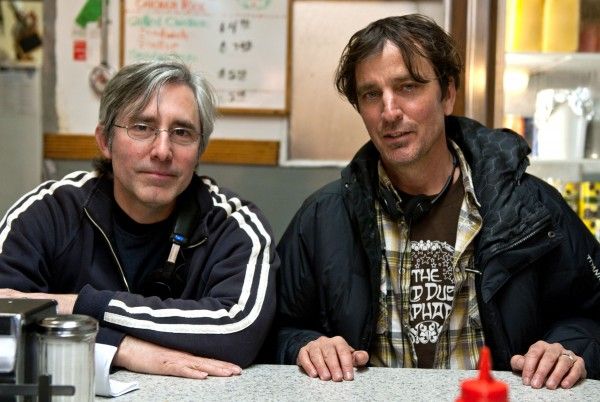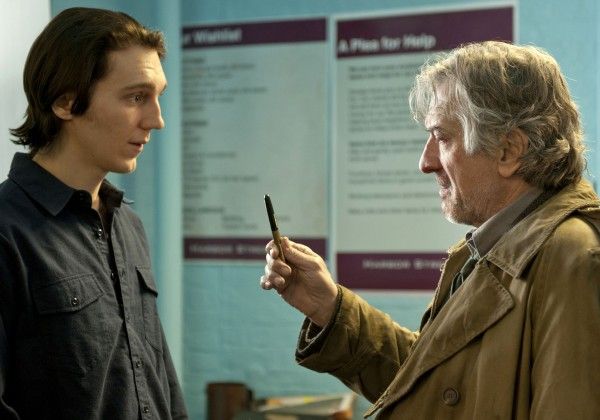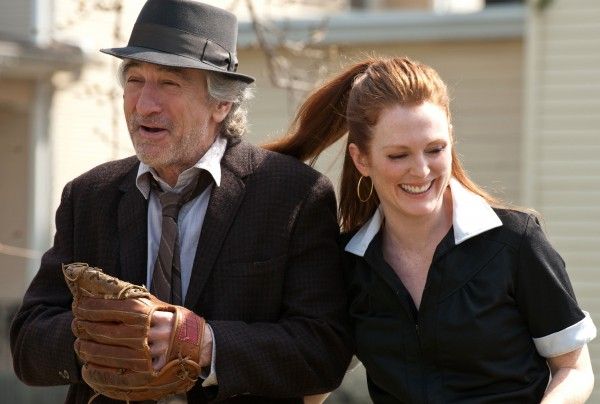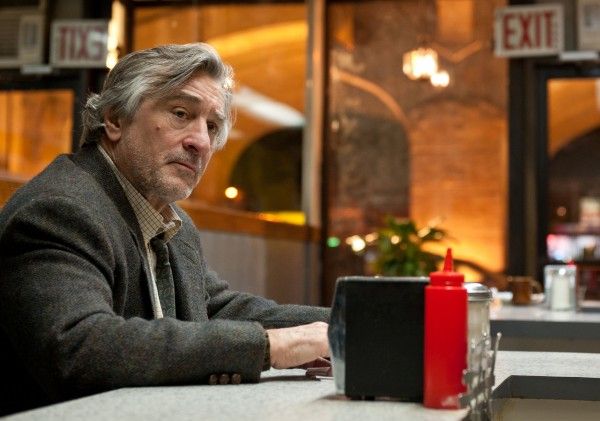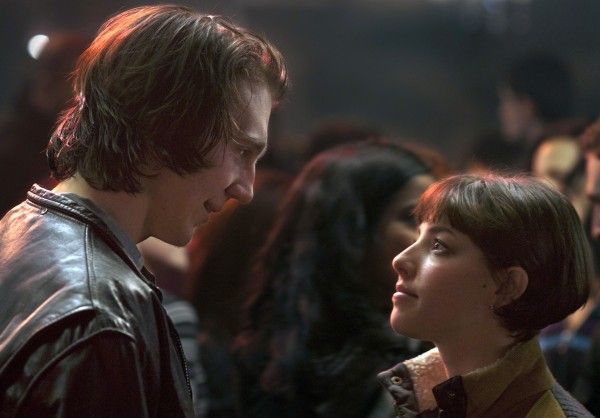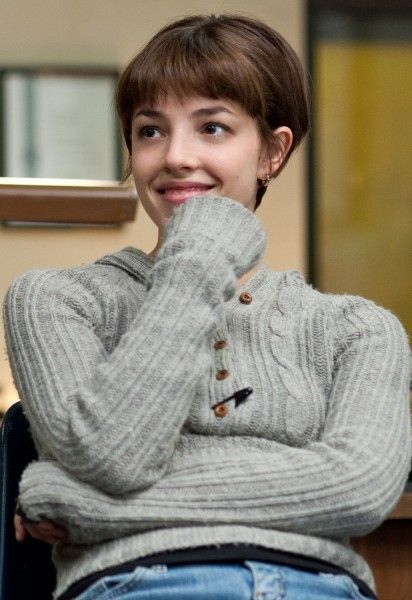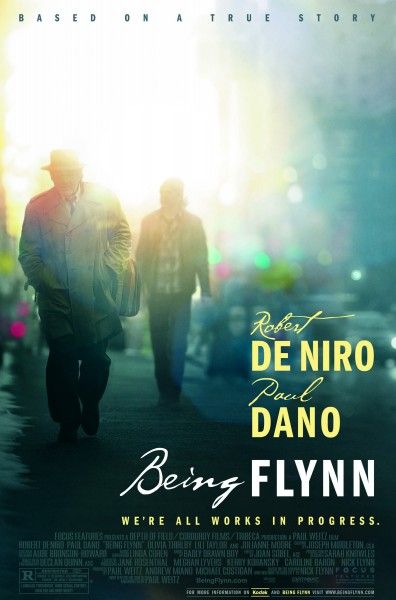Being Flynn (opening in theaters on March 2nd), adapted from Nick Flynn’s 2004 memoir Another Bullshit Night in Suck City, explores the often unconventional bond between parent and child. In the film, Nick (Paul Dano) is a young writer who misses the loving nature of his late mother (Julianne Moore) and hasn’t seen his father, Jonathan (Robert De Niro), a self-proclaimed “master storyteller,” in 18 years. After serving time in prison for cashing forged checks, losing his job as a cab driver and becoming homeless, Jonathan impulsively reaches out to Nick, who tries to integrate his father into his life, but quickly learns how complicated that truly will be.
At the film’s press day, director/screenwriter Paul Weitz spoke to Collider for this exclusive interview about what made him want to bring Nick Flynn’s story to life, why he’s drawn to father-son stories, why he went through 30 drafts of the script prior to filming (and how the final draft was ultimately the same as the first draft, at its core), and what the real-life father and son thought about the actors who played them. He also talked about how he’s developing something with Tina Fey, and that he’s going to be doing a play in New York in the Spring, with Topher Grace (reprising the character that he played in In Good Company) and Olivia Thirlby. Check out what he had to say after the jump.
Collider: What was it about Nick Flynn’s book, Another Bullshit Night in Suck City, that made you want to bring his story to the big screen?
Paul Weitz: It really got under my skin. It’s very strange because the situation is so specific. Nick found a place working at this homeless shelter, when he was in his 20s, and then encountered his dad there, and had that be where they rekindled their relationship. He was dealing with this mythological and extremely difficult dad. The central question of whether you can create yourself or whether you’re fated to be your dad was one that was really resonant for me.
I also liked the fact that it was about writing and creativity. My own dad was a fashion designer, but he always wanted to be a writer. He considered fashion design a frivolous thing, essentially. I remember him writing, late into the night, and he actually did have a couple of novels published. He was also of a generation that was very articulate and drank scotch a lot. I completely identified with the situation in the book.
Also, I’ve talked to a lot of people who the book was meaningful to. It operates on the level that everyone has some strange feeling about their parents. They mythologize their parents, and then wonder whether they’re fated to become them. Weirdly, it’s my most personal film, despite the fact that it’s someone else’s life and experience. I tried not to peg it to a specific time frame. I excluded things that would make it contemporary, such as cell phones or laptops, and I didn’t say, “This is set in 1987.” And, in terms of the city, the memoir is set in Boston, but I didn’t want to have everybody try to do their own version of a Boston accent. We shot it in New York, but I excluded recognizable New York City landmarks because I wanted it to feel indeterminate, like it was some sort of myth that was taking place.
Do you find yourself drawn to stories of family dynamics?
Weitz: Well, I’m specifically drawn to father-son stories. There are so many negative aspects to what people think it is to become a man that there’s an inherent question of whatever you’re taking on, with your adulthood. With this film, this is so the essence of some sort of father-son parable that I need to move on now.
I’m also interested in the idea of what one needs from people. At the point at which Nick (Paul Dano) meets Jonathan (Robert De Niro) in the movie, he doesn’t want his love. It’s way too late for that. He hasn’t seen him in 18 years. But, he needs some lesson in survival and egotism. Jonathan is a complete narcissist who considers himself one of the great writers in American history, even though he’s never had anything published. From the get-go, he dominates Nick. They’re challenging each other. When Jonathan shows up in the homeless shelter where Nick is working, it’s a bummer because Nick is actually good at his job. He’s found something that he’s good at, and that gets his pulse quickened, and Jonathan comes in and completely destablizes it. But, Jonathan doesn’t come in ashamed or hat-in-hand. He comes in and says, “I’d like a private room for the evening, please.” And then, when Nick can’t deliver that because that’s not what you get at this shelter, he says, “Don’t you have any clout here?”
We mythologize our parents, in different ways. One can have a father who is down-trodden, or one can have a father like this who is an egotist and is using you as the audience to his greatness. I’m interested in that particular aspect of family dynamics – what’s fake and the meaning in the fakeness.
What did Jonathan Flynn think of Robert De Niro playing him?
Weitz: Jonathan, in real life and in the book, is an incredible survivor. He’s like a magnificent cockroach. When I went with Bob [De Niro] and Nick to visit Jonathan, we sat down and Jonathan looked at Bob and said, “So, do you think you can pull this off?” Nick said, “Dad, he’s a very well-respected actor. He’s in The Godfather.” And Jonathan said, “Yeah, I hear you’re good, but do you think you’re going to be able to play me?” Jonathan is a very problematic guy with massive character flaws and a sense of his own greatness and, while he never achieved it in the way that he thought he would, he has had a book written about him and now a movie made about him, where he’s played by an iconic American actor. Weirdly, his skewed vision of reality has come true.
In the film, Nick Flynn goes through a process of questioning who he is and why he’s doing what he’s doing. Do you feel that, when you went through that, you found an answer that satisfied you?
Weitz: Yes. I like thinking about the dignity of work. When I’m on a film set, my job is to be the director and make decisions about everything and help everybody do their job properly. It’s as important to me that I be respectful to people and the crew, that it is that the film be good. The portrayal of the homeless shelter in this movie is a particular one, in that, when Nick shows up there, he finds something that he’s good at and that’s exciting to him. The shelter is portrayed in a way that I think is accurate to a particular experience of it. It’s a bunch of colorful people, gathered together in a subculture. I was thinking about that a lot. I also only had 35 days to make the film and I didn’t have much money, which was great. As I was making it, I was really feeling that I had to make decisions so quickly that I was using everything I had learned from things that I’d done properly and things that I’d made mistakes on, over the last 10 years as a filmmaker. I used every single thing I had learned, on this film, so it did make me feel good.
Was there a process in getting Nick Flynn to trust you and really see this as a character and not just him, since you would obviously have to take some dramatic license with the story?
Weitz: Yeah, no question. In terms of it being a character, one of the first things I said when I first sat down with him was, “May we please talk about a character named Nick Flynn? I’m going to say, ‘Nick does this,’ or ‘Nick does that,’ and I’m not going to say, ‘You.’ And please, if you can, don’t say, ‘I,’ while we’re talking about it.” While that was weird, at first, I do think that’s eventually how Nick processed it. Nick told me that, when he first wrote the book, he was out on the circuit with people who had done successful memoirs and, since that time, a couple of those people were shown to have been lying about things that happened to them in their lives. Nick said that he would always say, “These things did happen, but I’m already lying about them because I’m telling you a story about them, so they immediately become something other than the truth.”
His kindness, and his sense of humor and irony helped me immensely because it must have been bizarre to read 30 drafts of this script. And then, eventually, he put his life on hold and was there every day of the shooting, even for stuff that I imagine was extremely hard for him to be around. He’s a really generous person. It was helpful, too, that he’s married to Lili Taylor because she has a sense of the weirdness of the film business and was able to reassure him that I was really passionate about it and that I was not completely lying when I said I intended to make it and would not just write drafts, ad infinitum.
What took 30 drafts? Was that just you being hard on yourself?
Weitz: I would have happily made the first draft, but it was at a bigger budget and with a bigger studio and, as much as they might have liked the idea of making it, it didn’t work for them economically. I just kept going back to it. I’d be doing other stuff, and then I’d write a draft. I’d let it go for a month, and then I’d think, “Oh, I want to look at that again.” When you go back to something after a month, I’d see a lot of things I did wrong, so I’d just keep re-writing it. It was some weird intellectual exercise. And, there was something reassuring about just writing drafts and not actually shooting it because then I wouldn’t have to judge whether I had lived up to what I had intended to do or not. It was a surreal process.
How different was the final draft from where you started?
Weitz: At its core, it was the same as the first draft. It was just way shorter because I didn’t have enough time to shoot stuff I wasn’t sure was going to be in the movie. I had to make a lot of big decisions about what I wasn’t going to put in and what was most important to me. But, I think it’s not compromised, in the way that the first draft was not compromised.
Does that make things challenging for the DVD, since you won’t have many deleted scenes to put on it?
Weitz: Yeah, that’s true. The deleted scenes are more like deleted lines. That may be hard for them. I really question whether to do commentary for DVDs. I started out doing commentary. Maybe I was just happy to hear my own voice or something. But, there’s a degree of, if the thing you’re making is good, then you don’t know exactly what was going on. You might be able to theorize about it, but you might be cheapening it by giving your opinion about what it is. I guess the way that people are seeing movies is changing so much now, with people seeing so many movies streaming. It probably is hard not to have wacky outtakes. I’m mortified by practical jokes, so there’s very rarely any wacky outtakes on any movie I’m doing, even if the movie is wacky.
What was Nick Flynn’s reaction to have Paul Dano playing him, and what was it about him, as an actor, that led you to cast him?
Weitz: Paul doesn’t have vanity on screen. I think he looks different from other actors of his generation. The only person I could say he’s akin to is Max von Sydow, in the early [Ingmar] Bergman films, in terms of his look and presence. He’s very smart. And, he’d acted twice with Daniel Day-Lewis, and I know that Daniel Day-Lewis is an intimidating presence. I felt that he would challenge Bob [De Niro], and he was a smart, respectful guy, so he wouldn’t challenge him when the camera wasn’t rolling. I thought that it was going to be the best of both worlds, where I’d have a good collaborator, in terms of the overall story, but at the same time, someone who would absolutely go for it, no matter what, when the camera was rolling. It felt like there was something fresh about it.
Did meeting both Nick and Jonathan Flynn effect how you approached writing this?
Weitz: Yeah. I think Nick’s sense of irony and the fact that he has no self-pity really effected the writing. There could be a version of this story that is a real woe-is-me version, but instead there’s a gallows laughter, that is in the book and in Nick’s everyday dealings, that gave me license to make the movie I felt most deeply. Meeting his dad, his dad is a character. He’s a horrifying character, but he’s also very amusing.
The first time I met him, we were in his apartment. In the movie, Jonathan has this club with nails driven into it that he threatens people with. Jonathan had lost that club, by the time I had met him, but he did pull, from under his mattress, a two foot long machete and waved that in my face to see how I would react, saying that nobody screws with him, while Nick was sitting a few feet away, chuckling. I just tried to go dead and not make any sudden moves. The thing is, he’s a very theatrical character, in real life. It’s actually really hard to play somebody who, in real life, is as theatrical and articulate as Jonathan is, but it was really touching to see how hard Bob [De Niro] worked on the movie.
What do you enjoy about working with Robert De Niro?
Weitz: Well, the first thing is that he’s a nice guy. He actually was a producer on About a Boy, and there was a specific way in which he was helpful to us on that. Nicholas Hoult was the little boy in that and his character is depressed for a lot of the movie. We shot those scenes first, and the studio saw the dailies and said, “You’ve hired a depressed little boy, who doesn’t emote at all,” and they were giving us a hard time about it. We sent the dailies to Bob [De Niro] and said, “Would you please look at this and, if you think he’s good, would you help us out here?” So, Bob saw it and called the studio and said, “The kid is a really good actor. It’s going to be fine.” That was my first interaction, working with Bob.
And then, he read this material and really got invested in it and stuck with it, over the course of years and over the course of the budget being drastically reduced. It’s funny with him because he’s really funny, but he says things in such a deadpan manner that you’re not sure if he’s joking or not. Finally, I realized that he was joking, a lot of the time, but he didn’t care if you laughed, or if you understood that he was joking.
It’s actually quite a lot of fun, working with him. You have to be somewhat conscious of the fact that you’re working in an art form with somebody who’s one of the bedrocks of the art form, in terms of the work he’s done. In the case of this character, I felt like that was beneficial because the character is almost mythological to his son and, as an audience, there’s something mythological about Bob. He’s bringing all this baggage to it, of his long career. I thought that was actually a good thing, in this case, as opposed to something that would throw you out of the movie. I really like him and respect him, and I find him respectful of other people on the set. He has a respect for the nuts and bolts of the work that I find meaningful, and I find him really unpretentious.
Were there challenges in creating the Denise (Olivia Thirlby) character, since she’s not in the book?
Weitz: She’s an amalgam of a couple of characters that are mentioned in the book, and young women that I saw working in shelters. If you go to Pine Street Inn, you’ll see young women working in this completely all-male environment, and they’re carrying it off through the force of their personality and self-confidence. They’re able to not be intimidated by the situation. I was very interested in what drove different people to work in this environment and thrive in it.
Also, I was very keen to not have the movie be about “homelessness,” but to have it be about specific people who are in these situations. I felt like I needed somebody to have their own tragedy that they were dealing with, that Nick encounters. In the movie, Nick is also a narcissist. He’s different from his father, but also suffers from his own self-importance. So, he never asks Denise very integral questions, as they go along. She withholds information from him, and he doesn’t really ask. It was a calculated risk to introduce the character.
Do you have any idea what you’re going to do next?
Weitz: I’m not sure. I might be doing something with Tina Fey, that I’ve been developing for awhile. And, I have a play that’s going on in New York, in the Spring, that I’ll be doing with Topher Grace. It’s actually about a character that he played in a movie I made, called In Good Company, where he played this young businessman who hits the skids. It’s the same character. Although Topher never had any intention of doing a play, it looks like he’s going to be doing this play, to play this character again. It also looks like Olivia is going to be in it, playing a young businesswoman who’s blind.

